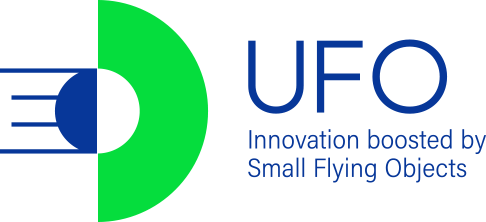Methodology
Internal awareness workshops on SFOs, embedded KETs, data analysis and processing capabilities and interviews with customers to identify market trends and how they can take benefit of the SFO
UFO will mobilise customers among their members and networks to define attractive market opportunities to be transformed into challenges for the UFO call for proposals.
To reach this objective, it is first essential that all UFO partners share the same common knowledge about the SFO, embedded KETs, data analysis and processing and their capabilities to be able to verbalise it and pre-identify potential customers among their clusters members and networks.
Relevant embedded KETs for SFOs could be for instance: optical devices as micro cameras or micro telescopes; thermal devices as infrared sensors (bolometer); radio frequency devices as micro receiver/transmitter for various bands; small platform devices as micro inertial sensors, power units, etc.; ground segment devices as Earth terminals, control centres. Data analysis and processing techniques could be: machine learning, artificial intelligence, and all software techniques that can support SFO data exploitation to the benefit of the 6 targeted markets.
This common knowledge will be achieved through the organisation of dedicated awareness workshops for the members of the consortium. The second step will then consist in individually contacting relevant customers and collect challenges from them through interviews.
Internal awareness workshops on SFOs, embedded KETs, data analysis and processing capabilities and interviews with customers to identify market trends and how they can take benefit of the SFO
UFO will mobilise customers among their members and networks to define attractive market opportunities to be transformed into challenges for the UFO call for proposals.
To reach this objective, it is first essential that all UFO partners share the same common knowledge about the SFO, embedded KETs, data analysis and processing and their capabilities to be able to verbalise it and pre-identify potential customers among their clusters members and networks.
Relevant embedded KETs for SFOs could be for instance: optical devices as micro cameras or micro telescopes; thermal devices as infrared sensors (bolometer); radio frequency devices as micro receiver/transmitter for various bands; small platform devices as micro inertial sensors, power units, etc.; ground segment devices as Earth terminals, control centres. Data analysis and processing techniques could be: machine learning, artificial intelligence, and all software techniques that can support SFO data exploitation to the benefit of the 6 targeted markets.
This common knowledge will be achieved through the organisation of dedicated awareness workshops for the members of the consortium. The second step will then consist in individually contacting relevant customers and collect challenges from them through interviews.
Collaboration and networking activities for SMEs using the open space platform
![]() UFO wants to provide SMEs the opportunity to highlight their own state of the art and strengths. The key is to connect people using very attractive opportunities. UFO will develop the networking through a COTS open space platform composed of connected rooms within the UFO clusters premises with online software services for quick and efficient communication. It will allow remote and online cross-fertilisation sessions, B2B meetings, exchange of information, demonstration, access to product catalogue, support by experts, partner search or project follow-up across Europe. It will save travel costs and time lost in transit.
UFO wants to provide SMEs the opportunity to highlight their own state of the art and strengths. The key is to connect people using very attractive opportunities. UFO will develop the networking through a COTS open space platform composed of connected rooms within the UFO clusters premises with online software services for quick and efficient communication. It will allow remote and online cross-fertilisation sessions, B2B meetings, exchange of information, demonstration, access to product catalogue, support by experts, partner search or project follow-up across Europe. It will save travel costs and time lost in transit.
The cross-fertilisation sessions are creative sessions in small groups of participants with various profiles (SMEs, large companies, research, experts, customers…) based on an already tested method that has already proven its worth in another INNOSUP-1 project, NEPTUNE. Within this framework about 100 cross-sectoral and cross-border ideas emerged per session.
The methodology consists in the following main steps: short presentation of challenges in emerging industries, ice-breaking, introduction of the participants to each other, completion of an ideation matrix with in the lines challenges and in columns SFOs, embedded KETs and ICT technologies, exchanges among the participants about the proposed ideas and peer review ranking (feasibility, market potential, etc.), expression of interest for certain ideas and proposition of competencies to the development of the idea, exchange of contacts. In addition, each cluster will also organise local events to relay information, attract SMEs and create links with SMEs from other clusters.
UFO wants to provide SMEs the opportunity to highlight their own state of the art and strengths. The key is to connect people using very attractive opportunities. UFO will develop the networking through a COTS open space platform composed of connected rooms within the UFO clusters premises with online software services for quick and efficient communication. It will allow remote and online cross-fertilisation sessions, B2B meetings, exchange of information, demonstration, access to product catalogue, support by experts, partner search or project follow-up across Europe. It will save travel costs and time lost in transit.
The cross-fertilisation sessions are creative sessions in small groups of participants with various profiles (SMEs, large companies, research, experts, customers…) based on an already tested method that has already proven its worth in another INNOSUP-1 project, NEPTUNE. Within this framework about 100 cross-sectoral and cross-border ideas emerged per session.
The methodology consists in the following main steps: short presentation of challenges in emerging industries, ice-breaking, introduction of the participants to each other, completion of an ideation matrix with in the lines challenges and in columns SFOs, embedded KETs and ICT technologies, exchanges among the participants about the proposed ideas and peer review ranking (feasibility, market potential, etc.), expression of interest for certain ideas and proposition of competencies to the development of the idea, exchange of contacts. In addition, each cluster will also organise local events to relay information, attract SMEs and create links with SMEs from other clusters.
Call for proposals to create cross-sectoral links between SMEs and encourage the emergence of disruptive project ideas

 The UFO call for proposals will be launched at the beginning of the project in order to give SMEs enough time to develop their projects within the UFO timeframe. The call will include the challenges identified in the six targeted emerging industries, however SMEs will also have the possibility to propose their own SFO application idea for one of the given emerging industries.
The UFO call for proposals will be launched at the beginning of the project in order to give SMEs enough time to develop their projects within the UFO timeframe. The call will include the challenges identified in the six targeted emerging industries, however SMEs will also have the possibility to propose their own SFO application idea for one of the given emerging industries.
The selection process and objective will be similar for proposals answering the challenges or for proposals emitted directly by SMEs. The selection will be done by a jury composed of 3 representatives of the consortium and 1 external evaluator per proposal. Compared to the UFO stage 1 proposal, the Climate KIC confirmed its interest to be an associated member of the project. They would be part of the evaluation jury for the proposals addressing Climate change topics. Furthermore, when addressing Climate change topic, the selection criteria of the Climate-KIC (Climate relevance, Innovativeness, Start-up team, Business model, Financial business plan, Final assessment) to enable a single evaluation to access the UFO funding scheme and the Climate-KIC funding scheme. Nonetheless, it does not prevent a project to be funded only by one of the schemes.
Thus, a project could be granted by both UFO and the Climate-KIC, or only by UFO or only by the Climate-KIC. The potential issue of double funding projects will be closely monitored. The selection of the members of the consortium participating to the selection for one proposal will ensure that there is at least one representative of one SFO, embedded KETs and/or ICT technology cluster, one representative of the concerned emerging industry cluster and the cluster the applicant is member of and/or is established in the region.
Proposals will be selected according to different quantitative and qualitative criteria such as innovation (from TRL 4 but priority will be given to the highest TRLs), impact on the emerging industries or international market potential. The best ideas will be supported by specific FSTP depending on the need of the projects. The selection criteria will as well be aligned with the ones of the Climate-KIC for the proposals falling into the climate change scope in order to offer the possibility to the applicants to benefit as well from further funding from the Climate-KIC. Avoiding of double funding issues will be guaranteed.
UFO will ensure that the principles of transparency and equal treatment are respected. Furthermore, all evaluators will sign a non-disclosure agreement.
The UFO call for proposals will be launched at the beginning of the project in order to give SMEs enough time to develop their projects within the UFO timeframe. The call will include the challenges identified in the six targeted emerging industries, however SMEs will also have the possibility to propose their own SFO application idea for one of the given emerging industries.
The selection process and objective will be similar for proposals answering the challenges or for proposals emitted directly by SMEs. The selection will be done by a jury composed of 3 representatives of the consortium and 1 external evaluator per proposal. Compared to the UFO stage 1 proposal, the Climate KIC confirmed its interest to be an associated member of the project. They would be part of the evaluation jury for the proposals addressing Climate change topics. Furthermore, when addressing Climate change topic, the selection criteria of the Climate-KIC (Climate relevance, Innovativeness, Start-up team, Business model, Financial business plan, Final assessment) to enable a single evaluation to access the UFO funding scheme and the Climate-KIC funding scheme. Nonetheless, it does not prevent a project to be funded only by one of the schemes.
Thus, a project could be granted by both UFO and the Climate-KIC, or only by UFO or only by the Climate-KIC. The potential issue of double funding projects will be closely monitored. The selection of the members of the consortium participating to the selection for one proposal will ensure that there is at least one representative of one SFO, embedded KETs and/or ICT technology cluster, one representative of the concerned emerging industry cluster and the cluster the applicant is member of and/or is established in the region.
Proposals will be selected according to different quantitative and qualitative criteria such as innovation (from TRL 4 but priority will be given to the highest TRLs), impact on the emerging industries or international market potential. The best ideas will be supported by specific FSTP depending on the need of the projects. The selection criteria will as well be aligned with the ones of the Climate-KIC for the proposals falling into the climate change scope in order to offer the possibility to the applicants to benefit as well from further funding from the Climate-KIC. Avoiding of double funding issues will be guaranteed.
UFO will ensure that the principles of transparency and equal treatment are respected. Furthermore, all evaluators will sign a non-disclosure agreement.
Innovation support to SMEs

 A total of about 3,6M€, 85% of the UFO budget, is foreseen to be redistributed to SMEs to directly support innovation. 3M€ will be allocated to direct financial support and 600K€ to innovation services provided by UFO partners (Table 3). A maximum amount of 60 K€ of financial support per SME will be distributed enabling the emergence of 35-50 cross-sectoral projects involving 50-75 SMEs.
A total of about 3,6M€, 85% of the UFO budget, is foreseen to be redistributed to SMEs to directly support innovation. 3M€ will be allocated to direct financial support and 600K€ to innovation services provided by UFO partners (Table 3). A maximum amount of 60 K€ of financial support per SME will be distributed enabling the emergence of 35-50 cross-sectoral projects involving 50-75 SMEs.
A total of about 3,6M€, 85% of the UFO budget, is foreseen to be redistributed to SMEs to directly support innovation. 3M€ will be allocated to direct financial support and 600K€ to innovation services provided by UFO partners (Table 3). A maximum amount of 60 K€ of financial support per SME will be distributed enabling the emergence of 35-50 cross-sectoral projects involving 50-75 SMEs.
Sustainability of the SMEs funded projects

 The final objective is to support funded SMEs to reach the development of large-scale demonstrators, gain access to further financing mechanisms (public and private) and pursue towards market deployment. The UFO consortium aims as well at supporting non awarded SMEs which proposed a promising application. In that respect, UFO will organise by the end of its lifetime a Showcase Event to promote the results of the supported SMEs and foster linkages with potential investors, customers, public procurers and potential business partners.
The final objective is to support funded SMEs to reach the development of large-scale demonstrators, gain access to further financing mechanisms (public and private) and pursue towards market deployment. The UFO consortium aims as well at supporting non awarded SMEs which proposed a promising application. In that respect, UFO will organise by the end of its lifetime a Showcase Event to promote the results of the supported SMEs and foster linkages with potential investors, customers, public procurers and potential business partners.The final objective is to support funded SMEs to reach the development of large-scale demonstrators, gain access to further financing mechanisms (public and private) and pursue towards market deployment. The UFO consortium aims as well at supporting non awarded SMEs which proposed a promising application. In that respect, UFO will organise by the end of its lifetime a Showcase Event to promote the results of the supported SMEs and foster linkages with potential investors, customers, public procurers and potential business partners.
